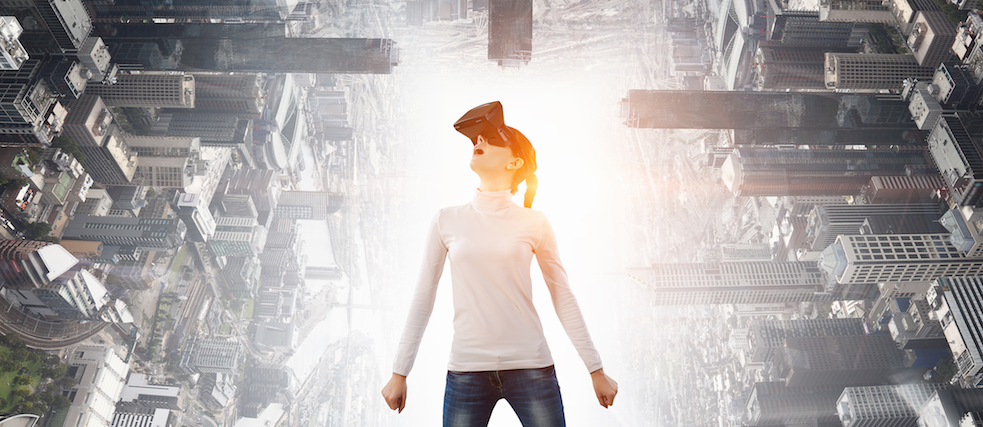Virtual Reality
VR “made in Germany”

Ten German virtual reality and 360-degree video projects you should know about.
By Verena Dauerer
Whether in schools or museums, advertising or marketing, journalism or psychotherapy – people in all kinds of fields are experimenting with technology that immerses users in a completely different, artificial reality. And new applications are discovered all the time. These ten companies, institutions and researchers are driving the development of virtual reality (VR) in Germany.
VR-Nerds
Computer game and sport rolled into one - a dream for any enthusiastic gamer. In Hamburg-based VR-Nerds’ VR arcade shooter game Tower Tag, players armed with virtual laser pistols move through a virtual world and try to take each other down. The scenery is optimised for the real playing field, so players can also feel what they see through their VR glasses, like when they duck behind a pillar for cover. In this mixed reality world, VR-Nerds organize vSport events known as Tower Tag Tournaments. The company also specialises in the production of VR games, and runs a popular news platform that features the latest in virtual reality and 360-degree video.
gamelab.berlin
What is it like to dance in a virtual environment? Choreographer Einav Katan-Schmid worked with gamelab.berlin on a VR performance that allows dancers move through their own world. In a symposium on dance moves in VR during the design stage, the team researched the physical techniques professional dancers use. gamelab.berlin is a project of the “Bild Wissen Gestaltung” interdisciplinary laboratory, an excellence cluster at Humboldt University in Berlin. Founded in 2013 by theatre expert and philosopher Thomas Lilge, it explores everything to do with virtual reality and gaming from transmedial storytelling and serious games to gamification.
SEHSUCHT Berlin
Berlin band Moderat envisioned an imaginative, dystopian world as the setting for their music video. So in 2016, producer and creative director Mate Steinforth collaborated with Berlin-based production studio Sehsucht on “Reminder,” an immersive, animated, 360-degree film. Instead of the usual live action takes, the video employs illustrations with a video-game look that VR renders even more vivid and real. Sehsucht specializes in 360-degree spots for commercial industries like the automotive sector.
Vragments
Fader is a browser-based tool developed by Berlin start-up Vragments in partnership with Deutsche Welle and Euronews. Journalists can use Fader to create collaborative 360-degree projects quickly and easily without depending on a production company, which is a huge leap forward for journalism. Vragments also produces documentaries and reports in-house. In cooperation with radio broadcaster Deutschlandradio Kultur, the company devised a virtual Stasi interrogation room in which users can experience the interrogation methods used by the East German secret police.
WDR & ARTE
Public broadcasters WDR and ARTE are just two of the companies currently recreating foreign countries and historical settings to take users into a VR-journalism experience. Westdeutsche Rundfunk (WDR) has made waves with its impressive 360-degree worlds, which include a 360-degree documentary about the Ausschwitz concentration camp, nominated for a Grimme Online Award, and a VR documentary about the terror attacks in Paris. German-French broadcaster ARTE also offers users immersive VR worlds, though for a very difference kind of experience. Viewers can swim alongside freedivers as they explore the depths of the sea, or attend VR performance by artist Jonathan Meese and his mother Brigitte.
Julia Leeb
Munich-based VR journalist Julia Leeb reports on states in turmoil, and has filmed documentaries in places like Syria, Afghanistan and North Korea. Leeb takes users out of their comfort zone, leading them directly into the heart of the action. One of her 2016 immersive 360-degree video reports takes viewers into a rebel village in the Congo.
INVR.SPACE GmbH
The Berlin-based INVR.SPACE production company develops interactive videos, VR and 360-degree applications of all kinds, from a VR experience of the Wacken Heavy Metal Festival and a VR installation with entertainer Friedrich Liechtenstein, to the 360-degree Eating Refugees art project from the Center for Political Beauty . INVR.SPACE has helped VR journalists, such as Julia Leeb, and editorial offices and film productions realise their VR projects. The production studio received the 2018 German Design Award for its innovate use of cutting-edge all-round camera technology and drones.
Frank Steinicke
In 2014, Frank Steinicke set a world record when he completely immersed himself in a virtual world for 24 hours. After this marathon experiment, Steinicke, a professor of human-computer interactions at the University of Hamburg, told the Süddeutschen Zeitung he struggled with nausea and was as exhausted as after long-haul flight. Frank Steinicke is one of Germany’s leading VR scientists and conducts research on the limits of human perception in computer-mediated reality. He predicts that the divide between the physical and virtual world will have dissolved in ten years’ time.
Egbert van Wyngaarden
Even the most cutting-edge technology would be pointless without content to transport. Egbert van Wyngaarden, professor of script and creative writing at Macromedia University of Applied Sciences in Munich and founder of the “Transmedia Bayern” interdisciplinary network, looks at the virtual narrative as a concept. Van Wyngaarden explores the possibilities and boundaries of immersive storytelling and virtual reality and researches ways of merging games and film.
Fraunhofer Virtual Reality Solution Center
When it comes to virtual worlds, no list would be complete without the Virtual Reality Solution Center at the Fraunhofer Institute for Production Systems and Design Technology. It develops visualization methods and rapid prototyping techniques that can be applied to industrial production processes and used to manufacture 3D tools used in mechanical engineering, for example. The center is currently working on a modular solution that would allow machine tools to be completely designed and produced in VR.